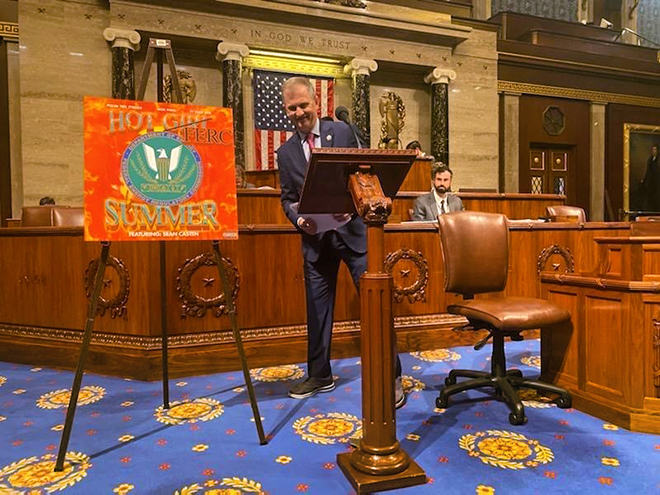S&P Global Offerings
Featured Topics
Featured Products
Events
S&P Global Offerings
Featured Topics
Featured Products
Events
S&P Global Offerings
Featured Topics
Featured Products
Events
Banking & Capital Markets
Economy & Finance
Energy Transition & Sustainability
Technology & Innovation
Podcasts & Newsletters
Banking & Capital Markets
Economy & Finance
Energy Transition & Sustainability
Technology & Innovation
Podcasts & Newsletters
S&P Global Offerings
Featured Topics
Featured Products
Events
26 Jul, 2021

By Molly Christian

| U.S. Rep. Sean Casten, D-Ill., wants to raise the Federal Energy Regulatory Commission's public profile and spur the agency to have its rules and procedures place a greater emphasis on climate change. Source: Rep. Casten's office |
A former energy industry executive now serving in the U.S. House of Representatives is on a mission: elevate the public profile of the Federal Energy Regulatory Commission.
In doing so, the representative hopes to build support in Congress to turbocharge FERC's authority on a range of policy issues that could facilitate the clean energy transition and help wholesale power markets combat climate change more effectively.
"What's the [Winston] Churchill line about, 'success is going from failure to failure with no loss of enthusiasm?'" U.S. Rep. Sean Casten, D-Ill., said in an interview with S&P Global Market Intelligence. "I've been trying for a long time to get people to care more about FERC. Because if we are going to get carbon emissions down as quickly as we need to, we are going to have to substantially electrify huge parts of our economy, which means building a lot of generation, building a lot of transmission, doing things that are uniquely within the purview of an agency that most Americans don't know anything about."
Among other duties, FERC approves rules governing competitive U.S. electricity markets, which serve about two-thirds of the country. As utilities and policymakers push to decarbonize the power sector, Casten wants to strengthen FERC's role in that transition.
Casten's legislative efforts
In a July 20 speech heralding the start of "Hot FERC Summer," Casten unveiled a bill called the Energy PRICE Act, which encourages FERC to reject wholesale power rates that do not factor in costs associated with greenhouse gas emissions. As support for the proposal, the bill pointed to FERC's authority under the Federal Power Act to determine if rates are just and reasonable and the U.S. Environmental Protection Agency's finding that greenhouse gas emissions endanger public health and welfare.
Although the bill acknowledges that FERC already has the legal authority to reject rates not reflecting greenhouse gas emissions costs, it aims to make FERC more proactive on the issue by "stapling pre-existing authority to a congressional obligation," Casten explained.
The proposal could address what Casten said is FERC's historical failure to properly price the climate impacts of different energy resources. Unless the environmental benefits of emissions-free generation are acknowledged, Casten said, renewable resources — which have zero marginal costs — could encounter the same market pressure as the country's nuclear power fleet, which is facing a wave of retirements as falling wholesale power prices make those plants less competitive.
"We for 30 years or more regulated all of our economy, not just the energy sector, with the idea that as long as consumer prices are falling, we can simply assume that everything else is going well," Casten said. "And I think we're nearing the end of that intellectual paradigm. ... We're going to lose the incentive to invest in new generation and new wires if we focus only on consumer price."
FERC has an "affirmative obligation to factor [environmental] externalities into the prices but more significantly to the structure of organized markets," Casten said. "If they do that in a thoughtful way, that will help ensure not only that we continue to build generation to keep the lights on but that we build generation that has the maximum environmental value."
The Illinois lawmaker also wants to sway FERC's policies on planning and cost allocation for new transmission, which industry members say will be key to boosting reliance on intermittent wind and solar energy and more efficiently using existing energy resources of all kinds.
In April, Casten joined U.S. Sen. Martin Heinrich, D-N.M., in sponsoring a bill that would order FERC to reform the interregional transmission planning process. Among other things, the bill says FERC should consider "cost allocation methodologies that reflect the multiple benefits provided by interregional transmission solutions," including "reductions in carbon emissions."
When it comes to transmission, "FERC has an awful lot of authority [that] they don't always exercise," Casten said. "So some of this is to create some obligation to go with the authority."
FERC's roughly decade-old Order 1000 sought to improve interregional transmission planning, but "I don't think anybody would say that intent has been totally realized," Casten observed.
The congressman also repeated past criticisms of regional grid operators, saying their governance structures allow members who benefit from higher power prices resulting from grid congestion to have too much sway.
"There are people who make money by virtue of the fact that they have an asset sitting on a congested node," Casten said. "Compelling FERC to deal with those issues of interregional connection, compelling them to prioritize the interconnection of assets that are not just cleaner, but also have zero marginal costs ... that's a big deal. And I think it's necessary to push a little bit."
Despite working to strengthen FERC's hand in transmission planning, Casten supports proposals from the Biden administration and some lawmakers to create a new national grid authority to ease the permitting and development of new projects.
"Having a single controlling agency, you know, whether that's at FERC or [the U.S. Department of Energy] ... I think that substantially solves the problem," Casten said. "And the more we can do to elevate that, the better."
Ahead of legislative action, FERC is already reexamining its transmission planning policies. The agency launched a major rulemaking on transmission July 15 that initially sought comment on several areas, including whether regional transmission organizations and independent system operators should plan for anticipated future generation needs.
Infrastructure outlook
Transmission policy changes and a host of other energy-related provisions could be included in broad infrastructure bills under negotiation in Congress. Senate Democrats hope to advance both a bipartisan infrastructure package that would contain transmission planning measures and a massive budget reconciliation bill that could include a clean electricity standard and other sweeping climate policies. The reconciliation package could offer Democrats a chance to enact major climate legislation without any Republican support, but the reconciliation process's "Byrd rule" prevents the inclusion of purely policy-related items.
The limitations of reconciliation combined with GOP resistance to big climate policies mean proposals such as the Energy PRICE Act are "just not in the list of tools right now," Casten said. But pinpointing what could succeed in the reconciliation package is also tricky.
"I think all of us in the House are sort of sitting there, trying to watch procedural rules in the Senate and figure out whether we're seeing puffs of white smoke or black smoke on a whole host of issues right now," Casten said. "And it's very hard to handicap."
But with an election year approaching in 2022, Democrats need to act quickly to address climate change, Casten said.
"We have a moment to get something really meaningful and necessary done on climate, and we don't have any more moments. We're just out of time," Casten concluded. "And I say that in terms of the time of our species, not the time of the electoral calendar."
